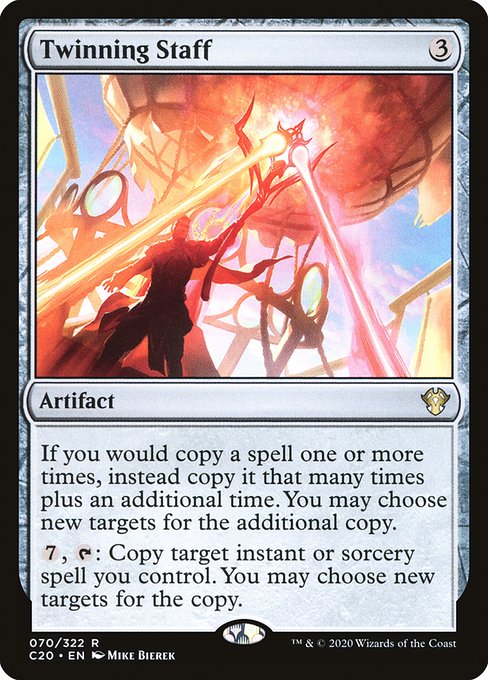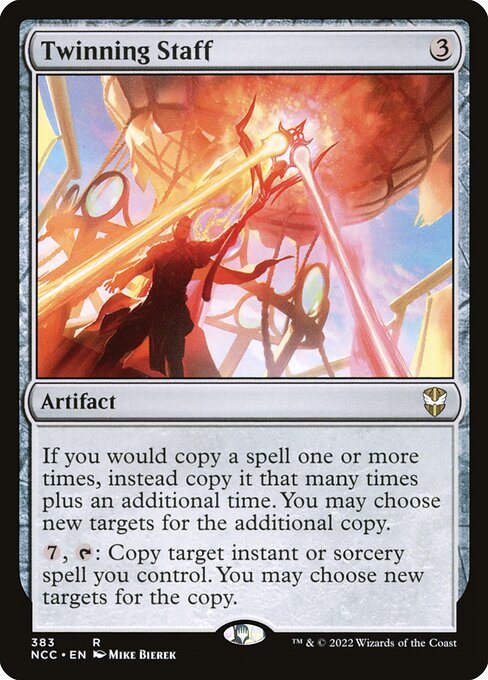standard
future
historic
gladiator
pioneer
explorer
modern
legacy
pauper
vintage
penny
commander
brawl
alchemy
paupercommander
duel
oldschool
premodern
Rulings
You may choose new targets for the additional copy, even if you can't choose new targets for the original copy or copies.
You choose whether the additional copy is put onto the stack before or after the original copy. If a spell is being copied more than once, you can even have the additional copy put onto the stack in between the original copies.
Twinning Staff's last ability can copy any instant or sorcery spell you control, not just one with targets.
The copy is created on the stack, so it's not “cast.” Abilities that trigger when a player casts a spell won't trigger. It will resolve before the original spell does.
If you have a second Twinning Staff, copying a spell results in two additional copies. If you have a third, you get three additional copies, and so on.
If the spell that's copied is modal (that is, it says “Choose one —” or the like), the copy will have the same mode. A different mode can't be chosen.
The copy will have the same targets as the spell it's copying unless you choose new ones. You may change any number of the targets, including all of them or none of them. If, for one of the targets, you can't choose a new legal target, then it remains unchanged (even if the current target is illegal).
If an effect copies a card rather than a spell (such as that of God-Eternal Kefnet), this doesn't cause an additional copy to be created.
If the spell that's copied has an X whose value was determined as it was cast, the copy will have the same value of X.
The controller of a copy can't choose to pay any alternative or additional costs for the copy. However, effects based on any alternative or additional costs that were paid for the original spell are copied as though those same costs were paid for the copy.
If the spell has damage divided as it was cast (like Mythos of Vadrok), the division can't be changed, although the targets receiving that damage still can. The same is true of spells that distribute counters.
You choose whether the additional copy is put onto the stack before or after the original copy. If a spell is being copied more than once, you can even have the additional copy put onto the stack in between the original copies.
Twinning Staff's last ability can copy any instant or sorcery spell you control, not just one with targets.
The copy is created on the stack, so it's not “cast.” Abilities that trigger when a player casts a spell won't trigger. It will resolve before the original spell does.
If you have a second Twinning Staff, copying a spell results in two additional copies. If you have a third, you get three additional copies, and so on.
If the spell that's copied is modal (that is, it says “Choose one —” or the like), the copy will have the same mode. A different mode can't be chosen.
The copy will have the same targets as the spell it's copying unless you choose new ones. You may change any number of the targets, including all of them or none of them. If, for one of the targets, you can't choose a new legal target, then it remains unchanged (even if the current target is illegal).
If an effect copies a card rather than a spell (such as that of God-Eternal Kefnet), this doesn't cause an additional copy to be created.
If the spell that's copied has an X whose value was determined as it was cast, the copy will have the same value of X.
The controller of a copy can't choose to pay any alternative or additional costs for the copy. However, effects based on any alternative or additional costs that were paid for the original spell are copied as though those same costs were paid for the copy.
If the spell has damage divided as it was cast (like Mythos of Vadrok), the division can't be changed, although the targets receiving that damage still can. The same is true of spells that distribute counters.
Rulings
You may choose new targets for the additional copy, even if you can't choose new targets for the original copy or copies.
You choose whether the additional copy is put onto the stack before or after the original copy. If a spell is being copied more than once, you can even have the additional copy put onto the stack in between the original copies.
Twinning Staff's last ability can copy any instant or sorcery spell you control, not just one with targets.
The copy is created on the stack, so it's not “cast.” Abilities that trigger when a player casts a spell won't trigger. It will resolve before the original spell does.
If you have a second Twinning Staff, copying a spell results in two additional copies. If you have a third, you get three additional copies, and so on.
If the spell that's copied is modal (that is, it says “Choose one —” or the like), the copy will have the same mode. A different mode can't be chosen.
The copy will have the same targets as the spell it's copying unless you choose new ones. You may change any number of the targets, including all of them or none of them. If, for one of the targets, you can't choose a new legal target, then it remains unchanged (even if the current target is illegal).
If an effect copies a card rather than a spell (such as that of God-Eternal Kefnet), this doesn't cause an additional copy to be created.
If the spell that's copied has an X whose value was determined as it was cast, the copy will have the same value of X.
The controller of a copy can't choose to pay any alternative or additional costs for the copy. However, effects based on any alternative or additional costs that were paid for the original spell are copied as though those same costs were paid for the copy.
If the spell has damage divided as it was cast (like Mythos of Vadrok), the division can't be changed, although the targets receiving that damage still can. The same is true of spells that distribute counters.
You choose whether the additional copy is put onto the stack before or after the original copy. If a spell is being copied more than once, you can even have the additional copy put onto the stack in between the original copies.
Twinning Staff's last ability can copy any instant or sorcery spell you control, not just one with targets.
The copy is created on the stack, so it's not “cast.” Abilities that trigger when a player casts a spell won't trigger. It will resolve before the original spell does.
If you have a second Twinning Staff, copying a spell results in two additional copies. If you have a third, you get three additional copies, and so on.
If the spell that's copied is modal (that is, it says “Choose one —” or the like), the copy will have the same mode. A different mode can't be chosen.
The copy will have the same targets as the spell it's copying unless you choose new ones. You may change any number of the targets, including all of them or none of them. If, for one of the targets, you can't choose a new legal target, then it remains unchanged (even if the current target is illegal).
If an effect copies a card rather than a spell (such as that of God-Eternal Kefnet), this doesn't cause an additional copy to be created.
If the spell that's copied has an X whose value was determined as it was cast, the copy will have the same value of X.
The controller of a copy can't choose to pay any alternative or additional costs for the copy. However, effects based on any alternative or additional costs that were paid for the original spell are copied as though those same costs were paid for the copy.
If the spell has damage divided as it was cast (like Mythos of Vadrok), the division can't be changed, although the targets receiving that damage still can. The same is true of spells that distribute counters.
Votre collection ? vos decks ?
Envie de gérer votre collection et/ou créer des decks ?


 0
0
 6.23€
6.23€
